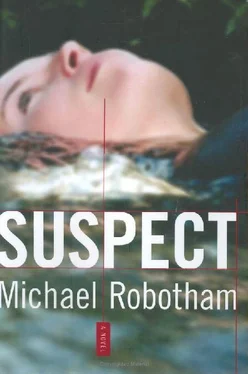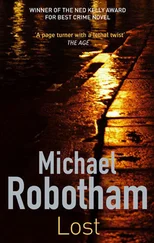Michael Robotham - Suspect
Здесь есть возможность читать онлайн «Michael Robotham - Suspect» весь текст электронной книги совершенно бесплатно (целиком полную версию без сокращений). В некоторых случаях можно слушать аудио, скачать через торрент в формате fb2 и присутствует краткое содержание. Жанр: Триллер, на английском языке. Описание произведения, (предисловие) а так же отзывы посетителей доступны на портале библиотеки ЛибКат.
- Название:Suspect
- Автор:
- Жанр:
- Год:неизвестен
- ISBN:нет данных
- Рейтинг книги:4 / 5. Голосов: 1
-
Избранное:Добавить в избранное
- Отзывы:
-
Ваша оценка:
- 80
- 1
- 2
- 3
- 4
- 5
Suspect: краткое содержание, описание и аннотация
Предлагаем к чтению аннотацию, описание, краткое содержание или предисловие (зависит от того, что написал сам автор книги «Suspect»). Если вы не нашли необходимую информацию о книге — напишите в комментариях, мы постараемся отыскать её.
Suspect — читать онлайн бесплатно полную книгу (весь текст) целиком
Ниже представлен текст книги, разбитый по страницам. Система сохранения места последней прочитанной страницы, позволяет с удобством читать онлайн бесплатно книгу «Suspect», без необходимости каждый раз заново искать на чём Вы остановились. Поставьте закладку, и сможете в любой момент перейти на страницу, на которой закончили чтение.
Интервал:
Закладка:
Michael Robotham
Suspect
Book One
"I did that," says my memory. "I could not have done that," says my pride, and remains inexorable. Eventually-the memory yields.
- FRIEDRICH NIETZSCHE, Beyond Good and Evil*1*
From the pitched slate roof of the Royal Marsden Hospital, if you look between the chimney pots and TV aerials, you see more chimney pots and TV aerials. It's like that scene from Mary Poppins where all the chimney sweeps dance across the rooftops twirling their brooms.
From up here I can just see the dome of the Royal Albert Hall. On a clear day I could probably see all the way to Hampstead Heath, although I doubt if the air in London ever gets that clear.
"This is some view," I say, glancing to my right at a teenager crouched about ten feet away. His name is Malcolm and he's seventeen today. Tall and thin, with dark eyes that tremble when he looks at me, he has skin as white as polished paper. He is wearing pajamas and a woolen hat to cover his baldness. Chemotherapy is a cruel hairdresser.
The temperature is three degrees Celsius, but the wind chill has chased it below zero. Already my fingers are numb and I can barely feel my toes through my shoes and socks. Malcolm's feet are bare.
I won't reach him if he jumps or falls. Even if I stretch out and lean along the gutter, I will still be six feet short of catching him. He realizes that. He's worked out the angles. According to his oncologist, Malcolm has an exceptional IQ. He plays the violin and speaks five languages-none of which he'll speak to me.
For the last hour I've been asking him questions and telling him stories. I know he can hear me, but my voice is just background noise. He's concentrating on his own internal dialogue, debating whether he should live or die. I want to join that debate, but first I need an invitation.
The National Health Service has a whole raft of guidelines for dealing with hostage situations and threatened suicides. A critical incident team has been pulled together, including senior members of staff, police and a psychologist-me. The first priority has been to learn everything we can about Malcolm that might help us identify what has driven him to this. Doctors, nurses and patients are being interviewed, along with his friends and family.
The primary negotiator is at the apex of the operational triangle. Everything filters down to me. That's why I'm out here, freezing my extremities off, while they're inside drinking coffee, interviewing staff and studying flip charts.
What do I know about Malcolm? He has a primary brain tumor in the right posterior temporal region, dangerously close to his brain stem. The tumor has left him partially paralyzed down his left side and unable to hear from one ear. He is two weeks into a second course of chemotherapy.
He had a visit from his parents this morning. The oncologist had good news. Malcolm's tumor appeared to be shrinking. An hour later Malcolm wrote a two-word note that said, "I'm sorry." He left his room and managed to crawl onto the roof through a dormer window on the fourth floor. Someone must have left the window unlocked, or he found a way of opening it.
There you have it-the sum total of my knowledge about a teenager who has a lot more to offer than most kids his age. I don't know if he has a girlfriend, or a favorite football team, or a celluloid hero. I know more about his disease than I do about him. That's why I'm struggling.
My safety harness is uncomfortable under my sweater. It looks like one of those contraptions that parents strap on to toddlers to stop them running off. In this case it's supposed to save me if I fall, as long as someone has remembered to tie off the other end. It might sound ridiculous, but that's the sort of detail that sometimes gets forgotten in a crisis. Perhaps I should shuffle back toward the window and ask someone to check. Would that be unprofessional? Yes. Sensible? Again yes.
The rooftop is speckled with pigeon droppings and the slate tiles are covered in lichen and moss. The patterns look like fossilized plants pressed into the stone, but the effect is slick and treacherous.
"This probably makes no difference, Malcolm, but I think I know a little about how you're feeling," I say, trying once more to reach him. "I have a disease too. I'm not saying that it's cancer. It's not. And trying to make comparisons is like mixing apples with oranges, but we're still talking about fruit, right?"
The receiver in my right ear begins to crackle. "What in Christ's name are you doing?" says a voice. "Stop talking about fruit salad and get him inside!"
I take the earpiece out and let it dangle on my shoulder.
"You know how people always say, 'It'll be fine. Everything is going to be OK'? They say that because they can't think of anything else. I don't know what to say either, Malcolm. I don't even know what questions to ask.
"Most people don't know how to handle someone else's disease. Unfortunately, there's no book of etiquette or list of dos and don'ts. You either get the watery-eyed, I-can't-bear-it-I'm-going-to-cry look or forced jokiness and buck-up speeches. The other option is complete denial."
Malcolm hasn't responded. He's staring across the rooftops as if looking out of a tiny window high up in the gray sky. His pajamas are thin and white with blue stitching around the cuffs and collar.
Between my knees I can see three fire engines, two ambulances and half a dozen police cars. One of the fire engines has an extension ladder on a turntable. I haven't taken much notice of it until now, but I see it slowly turning and begin to slide upward. Why would they be doing that? At the same moment, Malcolm braces his back against the sloping roof and lifts himself. He squats on the edge, with his toes hanging over the gutter, like a bird perched on a branch.
I can hear someone screaming and then I realize that it's me. I'm yelling the place down. I'm wildly gesticulating for them to get the ladder away. I look like the suicidal jumper and Malcolm looks totally calm.
I fumble for the earpiece and hear pandemonium inside. The critical incident team is shouting at the chief fire officer, who is shouting at his second-in-command, who is shouting at someone else.
"Don't do it, Malcolm! Wait!" I sound desperate. "Look at the ladder. It's going down. See? It's going down." Blood is pounding in my ears. He stays perched on the edge, curling and uncurling his toes. In profile I can see his long dark lashes blinking slowly. His heart is beating like a bird's within his narrow chest.
"You see that fireman down there with the red helmet?" I say, trying to break into his thoughts. "The one with all the brass buttons on his shoulders. What do you think my chances are of spitting on his helmet from here?"
For the briefest of moments, Malcolm glances down. It's the first time he's acknowledged anything I've said or done. The door has opened a crack.
"Some people like to spit watermelon seeds or cherry pits. In Africa they spit dung, which is pretty gross. I read somewhere that the world record for spitting Kudu dung is about thirty feet. I think Kudu is a kind of antelope but don't quote me on that. I prefer good old-fashioned saliva and it's not about distance; it's about accuracy."
He's looking at me now. With a snap of my head I send a foaming white ball arcing downward. It gets picked up by the breeze and drifts to the right, hitting the windshield of a police car. In silence I contemplate the shot, trying to work out where I went wrong.
"You didn't allow for the wind," Malcolm says.
I nod sagely, barely acknowledging him, but inside I have a warm glow in a part of me that isn't yet frozen.
"You're right. These buildings create a bit of a wind tunnel."
Читать дальшеИнтервал:
Закладка:
Похожие книги на «Suspect»
Представляем Вашему вниманию похожие книги на «Suspect» списком для выбора. Мы отобрали схожую по названию и смыслу литературу в надежде предоставить читателям больше вариантов отыскать новые, интересные, ещё непрочитанные произведения.
Обсуждение, отзывы о книге «Suspect» и просто собственные мнения читателей. Оставьте ваши комментарии, напишите, что Вы думаете о произведении, его смысле или главных героях. Укажите что конкретно понравилось, а что нет, и почему Вы так считаете.












